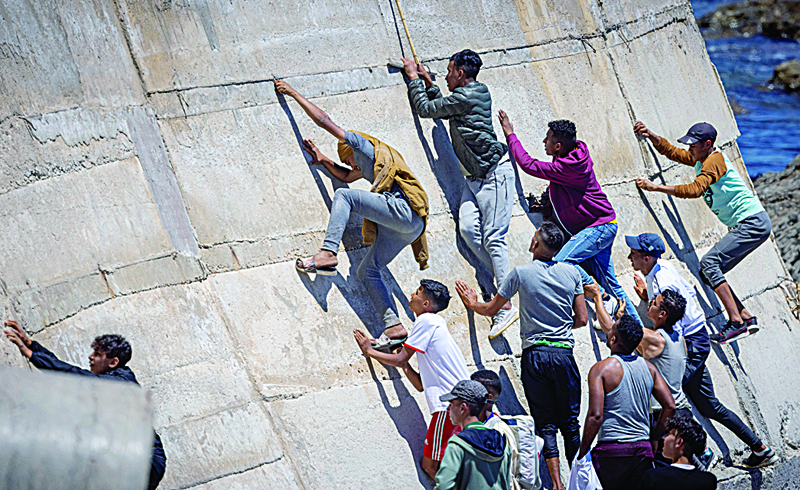 Migrants climb a sea wall in the northern town of Fnideq after attempting to cross the border from Morocco to Spain's North African enclave of Ceuta Wednesday. - AFP
Migrants climb a sea wall in the northern town of Fnideq after attempting to cross the border from Morocco to Spain's North African enclave of Ceuta Wednesday. - AFPFNIDEQ, Morocco: Spain accused Morocco of "blackmail" yesterday for allowing a record 8,000 migrants to reach the Spanish North African enclave of Ceuta, sparking a crisis that saw clashes on the Moroccan side of the border overnight. Spanish authorities were caught by surprise on Monday when large numbers of mostly young people began swimming or using small inflatable boats to cross the frontier as the Moroccan border forces looked the other way, quickly leaving the tiny territory overwhelmed.
But Madrid moved quickly to return most of the migrants and calm has largely returned the Spanish beach of Tarajal in Ceuta, where soldiers and armored vehicles have been deployed in large numbers. The outskirts of the Moroccan border town of Fnideq were deserted yesterday, also under a heavy security presence. However the previous night hundreds of Moroccan youths threw stones at Moroccan forces guarding the border, forcing them to retreat, according to an AFP correspondent at the scene.
The youths also set fired to a motorcycle. The migrant influx comes amid tensions between Rabat and Madrid over Spain's decision to provide medical treatment for the leader of the Polisario Front, Brahim Ghali, who has COVID-19. The Polisario Front has fought for the independence of Western Sahara, a former Spanish colony mainly under Moroccan control. Spanish Defense Minister Margarita Robles said Morocco's actions were "an aggression of Spanish borders and of the borders of the European Union".
"We are not talking about youths aged 16, 17, children as young as seven or eight were allowed through according to NGOs... ignoring international law," she said in an interview with Spanish public radio yesterday. "Call it what you want but I call it blackmail," she said, adding "it is not acceptable to put the lives of minors or of people of one's own country, at risk."
'I will try my luck again'
Spain's government said that around 5,600 of the 8,000 migrants had already been sent back, and there were no new entries on Wednesday as anyone who reached Ceuta's beach was immediately returned. Some of the returned migrants said they hoped to try cross over into Ceuta again if border controls were eased once more. "I have no future here, I want to work to help my family," 17-year-old Mohamed told AFP in Fnideq after being returned from Ceuta.
He left his studies and his family in Morocco to try to enter Spain in search of a better life. Hassan, 17, said "one day I will try my luck again and I will make it," adding he "dreams of living in Europe". Barefoot or in sandals, a crowd of mostly young people have tried to cross into Ceuta, a small enclave of 84,000 inhabitants which is connected to mainland Spain by ferry services across the narrow Strait of Gibraltar.
Ceuta, along with Spain's other North African enclave Melilla, have the European Union's only land border with Africa and have long been a magnet for migrants seeking a better life in Europe. Earlier this week Spanish soldiers fired tear gas to prevent the migrants from nearing the border fence. Several people were injured according to Moroccan media, but Rabat has not offered an official figure.
'Pawns in a political game'
Spain has received the support of top European officials, with European Commission vice president Margaritis Schinas warning that Europe "won't let itself be intimidated by anyone on the issue of migration" in a veiled allusion to Morocco. Rabat responded in the form of a flurry of angry dispatches published by the official MAP news agency saying that "Morocco is a sovereign country" and "is not the police of Europe".
Several NGOs have expressed concern over the huge number of minors who have crossed over into Ceuta from Morocco-and the fact that Madrid is sending them back. "Asylum seekers and migrants are being used as pawns in a political game between Morocco and Spain," Amnesty said in a statement. It estimated that "around 2,000 unaccompanied children" had entered Ceuta this week from Morocco. - AFP









